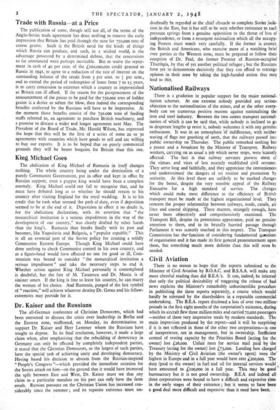Nationalised Railways
There is a gradation in popular support for the major national- isation
schemes. At one extreme nobody provided any serious objection to the nationalisation of the mines, and at the other every- body can see numerous positive reasons against nationalising the iron and steel industry. Between the two comes transport national- isation of which it can be said -that, while nobody is inclined to go to desperate lengths to resist it, nobody welcomes it with any genuine enthusiasm. It was in an atmosphere –cif indifference, with neither waving of flags nor gnashing of teeth, that the railways passed into public ownership on Thursday. The public remarked nothing but a poster and a broadcast by the Minister of Transport. Railway workers, carrying on as usual a job which never stops, were 'Scarcely affected. The fact is that railway servants possess most of the virtues and vices of less recently established civil servants. They serve long and faithfully, and they appreciate the conveniences and underestimate the dangers of set routine and promotion by seniority. At 'this level there are unlikely to be marked changes for the better, despite the very sensible appeal of the Railway Executive for a high standard of service. The changes which could make most difference to the efficiency of British transport must be made at the highest organisational level. They concern the proper relationship between railways, roads, canals, air lines and coastal shipping. These matters, strangely enough, have never been objectively and comprehensively examined. The Transport Bill, despite its pretentious appearance, paid no genuine attention to them, and in its brutally hurried passage through Parliament it was scarcely touched in this respect. The Transport Commission has the-function of considering fundamental questions of organisation and it has made its first general pronouncement upon them, but something much more definite than this will soon be needed.






































 Previous page
Previous page